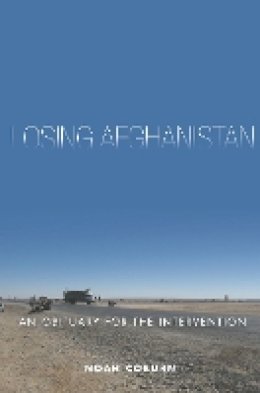Noah Coburn is Professor of Anthropology at Bennington College. He is the author of Bazaar Politics: Power and Pottery in an Afghan Market Town (Stanford, 2011) and Derailing Democracy in Afghanistan: Elections in an Unstable Political Landscape (2014) with Anna Larson. He has been conducting ethnographic research in Afghanistan since 2005, as well as working for the United States Institute of Peace, Chatham House and the Afghan Research and Evaluation Unit and as an election observer.
"Coburn's experienced eye demonstrates that understanding local culture is a two way street. Highly recommended for Afghans, or anyone puzzled by the policies of international military and civilian institutions and in need of practical advice on how to cope with their strange ways of thinking."—Thomas Barfield, Boston University "Rich in description and thick with ironies, Losing Afghanistan reveals the insanities of a war run by and for contractors, and by soldiers posing as development agents. In this first-hand account of war-time Afghanistan, Coburn navigates the various and sometimes shared assumptions of walled off foreigners and the world they created in which Afghans play but minor parts. A quiet indictment."—Catherine Lutz, Brown University "Losing Afghanistan provides a unique window into the longest, most costly US and international intervention since the Second World War. Having spent over a decade researching and writing about Afghanistan, living with ordinary Afghans, and a bewildering array of international actors, Coburn illuminates the chasm between what ordinary Afghans think and want, and what international actors assume and do, and the frustration and disillusionment that resulted."—Michael Keating, Associate Director, Chatham House, and Former UN Deputy Envoy to Afghanistan, Kabul "Though it receives little regard in the conference rooms where policy decisions are arrived at, anthropology in the person of field ethnographers like Noah Coburn provides a much-needed perspective that is almost always ignored or only turned to after the fact. In its careful attention to pinpointing the places where abstract policy gets stuck in practice, Losing Afghanistan demonstrates why anthropology is desperately needed as both counsel and corrective, and why its small-scale but critical truths are so often ignored."—David Edwards, American Anthropologist "Coburn convincingly shows that any anthropological understanding of the international intervention in Afghanistan needs to describe the specific subculture of the foreign military, humanitarian workers, consultants, or journalists who flocked into the country in the aftermath of the Taliban regime's fall....Coburn's compelling book is a must-read for everybody interested in Afghanistan and more generally in peacebuilding interventions."—Noah Coburn, Anthropological Quarterly

